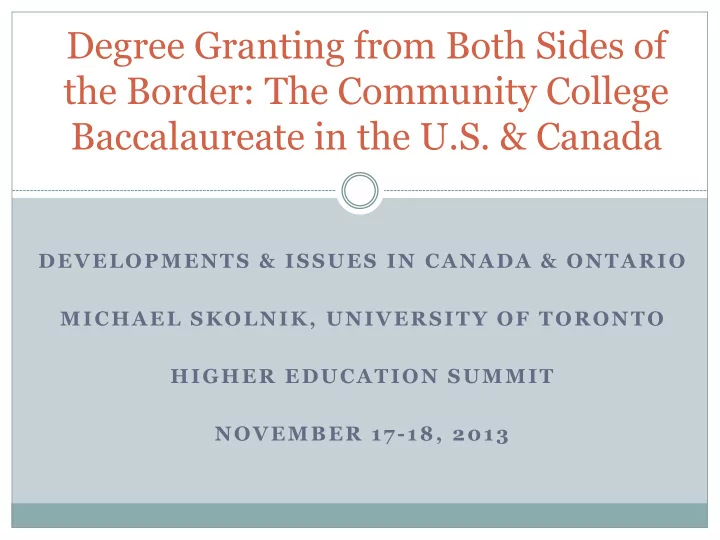

Degree Granting from Both Sides of the Border: The Community College Baccalaureate in the U.S. & Canada DEVELOPMENTS & ISSUES IN CANADA & ONTARIO MICHAEL SKOLNIK, UNIVERSITY OF TORONTO HIGHER EDUCATION SUMMIT NOVEMBER 17-18, 2013
College Degree Granting in Canada: Overview Started in the West, but now the predominant location is Ontario Permitted in BC, Alberta, Manitoba, Ontario, & PEI Still expanding in Ontario, less so in BC, and hardly at all in Alberta Principal motivations: to improve access to the baccalaureate degree; to provide a new type of preparation for the workforce that combines hands-on learning with high level knowledge
Colleges Awarding Degrees in Canada Province Colleges Programs British Columbia 10 34 Alberta 5 17 (a) Manitoba 3 13 (b) Ontario 12 79 Prince Edward Island 1 1 (a) 11 programs are at the polytechnics (NAIT, SAIT) (b) 10 programs are at University College of the North, mainly B.A.s and B.Ed.s
Major Development in BC & Alberta The colleges that were most active in awarding baccalaureate degrees have become universities but with continued mandate for college activities - 5 new “special purpose, teaching” universities in British Columbia (Capilano, Fraser Valley, Kwantlen Polytechnic, Thompson Rivers, and Vancouver Island) - 2 new teaching-focused universities in Alberta (MacEwan and Mount Royal) Issues - the data on numbers of college degree programs - institutional evolution
College Baccalaureate in Ontario: Issues Differentiation between colleges & universities (Drummond Report, Plant Commission) Proposed new three-year baccalaureate degrees in colleges Approval process for college baccalaureate degrees – Ontario is an outlier
College-University Differentiation Credentials awarded - degrees vs. diplomas, but this is not the only basis of differentiation Applied vs. Academic Orientation Colleges are more teaching-oriented Colleges are more accessible – they admit a more diverse student body in terms of socioeconomic and educational backgrounds Colleges are more responsive to government policy objectives
College Baccalaureates in “Parallel” Systems Netherlands Hogescholen (HBOs) 75 Finland Polytechnics 60 Flanders University-Colleges 53 Ireland Institutes of Technology 52 Denmark Colleges 40 Germany Fachhochschulen (FH) 40 Austria Fachhochschulen (FH) 21 New Zealand ITPs 20
Proposed 3 Year Baccalaureate Degrees Ontario one of the few places in the world that has 3 yr. PSE programs that don’t result in a degree (~600) Advanced Diploma programs seem to meet the baccalaureate degree standard of the European Higher Education Area and the Ontario qualification standard for the baccalaureate degree Many 3 yr. colleges degrees in other jurisdictions Ontario universities offer 3 yr. degrees Accuracy & competitiveness of present credential? A 3 yr. industry-focused baccalaureate degree would meet needs of industry & of students
College Degree Approval Internationally Degree qualification standards elsewhere are less detailed and include references to preparation for work (e.g. “practice -related knowledge) Quality standards elsewhere are fewer, less detailed and less prescriptive Most other jurisdictions have quite different admission requirements for entry to college and entry to university baccalaureate programs Most other jurisdictions have less prescriptive requirements for academic credentials of faculty
References: College Baccalaureate In Canada Fleming, R. & Lee, G.R. (2009). Canada: What’s in a title? In N. Garrod & B. MacFarlane (Eds.), Challenging boundaries: Managing the integration of postsecondary education. New York: Routledge, 93-110. Hurley, P. & Sá, C.M. (2013). Higher education policy and legitimacy building: The making of a new academic credential in Ontario, Higher Education Quarterly 67 (2), 157-179. Laden, B.V. (2005). The new ABDs: Applied baccalaureate degrees in Ontario. In D. L. Floyd, M. L. Skolnik, & K. P. Walker (Eds.), The community college baccalaureate: Emerging trends and policy issues . Sterling, VA: Stylus Publishing, LLC, 153-178. Mitchell, A.D., Trotter, L., Wilson, W. & Walmsley, R. (2012). Facilitating college to university transfer in the European Higher Education Area and beyond: Opportunities for Ontario’s colleges of applied arts and technology. London: Fanshawe College.
References, continued Mitchell, A.D., Feltham, M. & Trotter, L. (2013). Mapping the Ontario advanced diploma: European and American outcomes for business. A paper prepared for Colleges Ontario. London: Fanshawe College. Skolnik, M. L. (2005). The community college baccalaureate in Canada: Addressing accessibility and workforce needs. In D. L. Floyd, M. L. Skolnik, & K. P. Walker (Eds.), The community college baccalaureate: Emerging trends and policy issues . Sterling, VA: Stylus Publishing, LLC, 49-72. Skolnik, M.L. (2009). Theorizing about the emergence of the community college baccalaureate, Community College Journal of Research and Practice , 33, (2), 125-150. Skolnik, M.L. (2011). Re-conceptualizing the relationship between community colleges and universities using a conceptual framework drawn from the study of jurisdictional conflict between professions, Community College Review , 39 (4) , 352-375.
A few more references Skolnik, M.L. (2012). College baccalaureate degrees and the diversification of baccalaureate production in Ontario. Toronto: Author. http://www.oise.utoronto.ca/lhae/Faculty_Staff/782/Michael_ Skolnik.html. Skolnik, M.L. (2012). Rethinking the system of credentials awarded by Ontario’s colleges of applied arts & technology. A paper prepared for Colleges Ontario. Toronto: Colleges Ontario. Skolnik, M.L. (2013). College baccalaureate degree approval processes in other jurisdictions. A paper prepared for Colleges Ontario. Toronto: Colleges Ontario. Skolnik, M.L. (2013). Reflections on the nature and status of the applied baccalaureate degree. In N. Remington & R. Remington (Eds.), Alternative pathways to the baccalaureate . Sterling, VA: Stylus Publishing, LLC, 128-147.
Recommend
More recommend